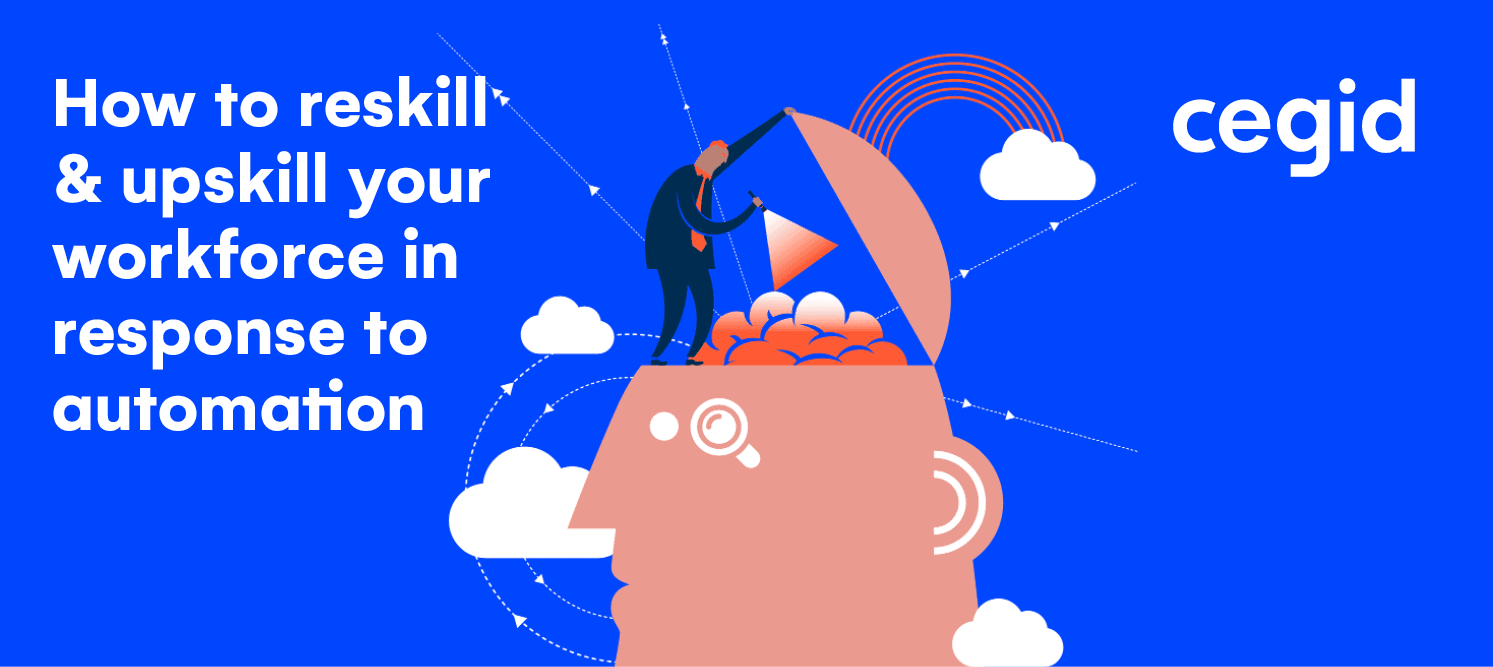Talent Management
Retraining, Upgrading, and Acquiring Skills in Response to Automation
8 March 2022

In such a context, it’s not surprising that process automation has become a must-have solution to maintain business productivity and profitability. As companies consider its implementation, HR leaders must consider how best to prepare the workforce for the future of work and put the right conditions in place to encourage talent to retrain, upgrade and acquire the skills needed to remain relevant.
What is automation?
Implemented until now to automate repetitive or manual processes, automation is growing in popularity since the integration of artificial intelligence (AI). This addition opens the door to the transformation of all business processes, even the most unusual, complex or thought-provoking ones.
Contrary to popular belief, the biggest benefit to companies is not cost savings from fewer people, but rather enabling them to do more, better and faster. By collaborating with technology, employees will get their work done with less effort but also more quickly. This permits more focus on complex, strategic value-add tasks that can only be performed manually.
Transforming the world of work
The risk assessment for nearly complete automation of jobs was 9.2%, while the risk assessment for automating large changes in jobs was 23.5%.
OECD, 2020
In the coming years, the technological shifts brought on by intelligent automation will reshape the world of work; offering unlimited potential to many professions and different sectors of the economy. As a result, jobs will be created, lost and reorganized, tasks will be reassigned, new procedures will be developed, and new business models will be created.
The transition to automation has begun more quickly than experts anticipated due to the pandemic and will continue at a much faster pace due to multiple factors affecting the sustainability of businesses such as: labor shortages, technological advances, and the lack of necessary skills.
To prepare for the future, companies will innovate to better anticipate and exploit major technological and workforce changes. They will consider how best to balance “technology and people” to maximize the potential of their workforce, create more value, and have a lasting impact on the business.
The Impact on Employees
By 2030, employees will spend 41% to 50% more time using technology skills.
McKinsey Workforce Institute
2018
The future of work will include a lot of changes for employees in the nature of jobs, the way they are modeled, how employees interact with technology, and the effort and efficiency to complete tasks. However, it will also offer them significant benefits such as simplification of work, increased productivity, and greater satisfaction in completing more complex, strategic tasks.
The changes ahead will require workers to retrain or upgrade their skills. Not surprisingly, the skills of the future will be those related to technology and cross-cutting skills including: problem solving, the ability to learn quickly, creativity, social intelligence, etc.5 These new skills will enable them to cope with potential job loss and navigate transitions to new jobs.
The jobs of the future will be those that are specialized or related to new technologies and ways of working, as well as those whose skills cannot be automated. The future will also be bright for occupations that require non-routine cognitive work. The service sector and routine occupations will be most at risk from the impact of smart technologies, given their high potential for automation.
To remain relevant in the job market, employees will have an interest in becoming actors of their employability, by being open to continuous learning, development and improvement. As well as taking charge of their career development.6 Fortunately, solutions already exist to support them in this way, most notably by:
- Consolidating all their career information in real time and giving employees the opportunity to showcase or contextualize their skills, ambitions and motivations.
- Suggesting the best job opportunities available internally, based on job requirements and information within their talent profile.
- Allowing them to apply for a position with a single click and easily track the progress of their application.
What role will HR play?
74% of companies say that reskilling their workforce will be important to their success in the next 12 to 18 months.
Deloitte Canada
According to Deloitte, the best technology will not enable employees to adapt and succeed in an ever-changing world. Rather, it is HR professionals who will support them in building a sustainable workforce ready to meet the challenges of today and tomorrow.
As a first step, a re-evaluation of the work in the company must take place by thinking about, for example, its potential for automation, the work that is being done and that will be done. An analysis of the optimal mix of “employee-machine” labor required to perform the work must consider: the impacts of automation on jobs, future labor needs, the impact of a lack of employees, current skills and abilities and those that will be required.7 This is a necessary exercise to determine the skills that need to be retrained, upgraded and developed, as well as to establish the means to quickly acquire the knowledge, skills and experience required to perform new roles.
One way to do this is by creating a culture of continuous learning and integrating workplace learning, experimentation and practice into training and talent development programs.
Given the importance of HR professionals in business transformation, it would be advisable to start with the automation of their leadership. This is a wise and strategic use of their time that will eventually contribute to the organization as a whole.
Conclusion
The best way for companies to prepare for the future of work is to properly anticipate and exploit the technological changes to come. This will depend largely on how well they can adapt to new technologies, while at the same time, preparing employees for their new challenges.
Building on “collective” intelligence and encouraging experimentation, learning and sharing of skills and experience in the workplace will help you build the workforce of tomorrow.


